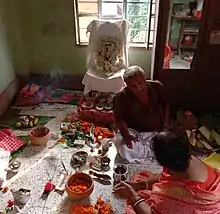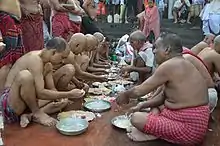Śrāddha
Śrāddha (Sanskrit: श्राद्ध) is a Sanskrit word which literally means anything or any act that is performed with all sincerity and absolute faith in it. (Śraddhā). In the Hindu religion, it is the ritual that one performs to pay homage to one's 'ancestors' (Sanskrit: Pitṛs), especially to one's dead parents.[1] Conceptually, it is a way for people to express heartfelt gratitude and thanks towards their parents and ancestors, for having helped them to be what they are and praying for their peace. It also can be thought of as a "day of remembrance". It is performed for both the father and mother separately, on their respective 'thithi' - death anniversaries as per Hindu calendar - Bikram Sambat. In addition it is performed for the entire community of 'pitr' - both from paternal and maternal side -collectively during the Pitru Paksha or Shraaddha paksha (Fortnight of ancestors), right before Sharad Navaratri in autumn.[2][3][4]

Etymology
'Śrāddha' means 'confidence, devotion', stemming from Proto-Indo-Iranian *ćraddʰaH- ('believe, have trust in'), ultimately from the Proto-Indo-European compound *ḱred-dʰeh₁- ('to put one's heart into somebody' > 'to believe'). It is cognate with the Latin crēdo ('to entrust, give credence'), the Old Avestan zrazdā- ('devoted, trusting, believing'), or the Old Irish creitid ('believe').[5][6]
Rituals

In practice, the karta (person who performs the Śrāddha) (1) invites Brahmanas (priests) that day, invokes in them the divinity of his/her parent, worships and feeds them (2) performs a homa (fire ritual), appeasing Agni and Soma - the deities who transmit the offerings to the ancestors, nourish and protect them and (3) offers balls of rice to the departed souls ("pinda pradaana", offered to the Pitṛs, the ancestral spirits).The offerings are made to three generations i.e. father, grandfather and great grandfather / mother, fathers’mother, fathers’ grandmother. The karta extends hospitality to the priest and concludes the ceremony by giving "dakshina" (fees) to the brahmanaas. (There are various other actions done to show respect to the Brahmanaas, like washing their feet etc. during the course of shraaddha). Crows are also revered in Hinduism and during Śrāddha the practice of offering food or pinda to crows is still in vogue.[7]
Since this is one of the more important and noble "Saṃskāras" (rituals meant to cleanse the mind and soul) that the Hindu sages have envisaged, it is imperative that the performer of the ritual[8] understands what he or she is doing.[9] Only then will the true intent of the ritual be fulfilled and the performer of the ritual feel completely gratified. Else, the ritual becomes just a mechanical exercise for one's part.
The Śrāddha period
The scripture mandate performing 96 Śrāddha karmas. However, these practices are difficult to be adhered to. In addition, once in year offerings are to a larger universe of forefathers - during the pitr paksha. In Hindu amanta calendar ( ending with amavasya ), second half of the month Bhadrapada is called Pitru Paksha: Pitṛpakṣa or Śrāddha pakṣa and its amavasya ( new moon ) is called sarvapitri amavasya. This part is considered inauspicious in muhurtaśāstra (electional astrology). At this time (generally September) crops in India and Nepal are ready and the produce is offered as a mark of respect and gratitude (by way of pinda) first to the ancestors be they parents or forefathers before other festivals like Navaratri begin.
Many people visit Hindu pilgrimage sites to perform, Śrāddha ceremonies, like Haridwar, Gokarneshwar, Nashik, Gaya etc. Haridwar is also known for its Hindu genealogy registers.
See also
- Antyesti
- Brahmin
- Hindu genealogy registers at Chintpurni, Himachal Pradesh
- Hindu genealogy registers at Haridwar
- Hindu genealogy registers at Jawalamukhi,Himachal Pradesh
- Hindu genealogy registers at Kurukshetra, Haryana
- Hindu genealogy registers at Peohwa, Haryana
- Hindu genealogy registers at Trimbakeshwar, Maharashtra
- Hindu genealogy registers at Varanasi
- Pitrs
- Sandhyavandhanam
- Vedic priesthood
- Śrāddha (Buddhadharma)
References
- "Shradh Puja: Five Facts you should Know about Death Anniversary Ritual In Hinduism". NewsGram. 4 September 2017.
- Prasad, R. C. (1995). Sraddha: The Hindu Book of the Dead. Motilal Banarsidass. ISBN 8120811925.
- Mittal, Sushil; Thursby, Gene, eds. (2004). Hindu World. Routledge Worlds. ISBN 1134608756.
- Lipner, Julius (2012). Hindus: Their Religious Beliefs and Practices (2 ed.). Routledge. p. 267. ISBN 1135240604.
- Benveniste, Émile (1969). Dictionary of Indo-European Concepts and Society (2016 ed.). Hau Books. pp. 134–135. ISBN 978-0-9861325-9-9.
- Lubotsky, Alexander. "Indo-Aryan Inherited Lexicon". Indo-European Etymological Dictionary Project. Leiden University. See entry Śrāddha- (online database).
- "It's a crow's day". The Hindu. 2001-07-26.
- "shraddha paksha". jaibhole.co.in.
- "How does the Shraddha ritual benefit descendants?". Spiritual Science Research Foundation. Retrieved 20 September 2020.
Further reading
- Shraaddha, R. K. Srikanta Kumaraswamy, IIT, Chennai. In the Kannada language
- ಆಶ್ವಲಾಯನ ಪಾರ್ವಣ ಶ್ರಾದ್ಧ ಚಂದ್ರಿಕಾ (kannada language) by mundodu narayana bhatta, hayagreeva nagara, udupi 576 102
External links
(An abridged English version of ಆಶ್ವಲಾಯನ ಪಾರ್ವಣ ಶ್ರಾದ್ಧ ಚಂದ್ರಿಕಾ, a treatise in Kannada on rigvedic ritual by Dr. M. Narayana Bhat]
- Pitru Paksha
- Pitru Paksha Puja
- Online Course for Basic Vedic Mantras,Shraaddha & Tharpana rituals for Brahmins Online Vedic Courses to learn from Home